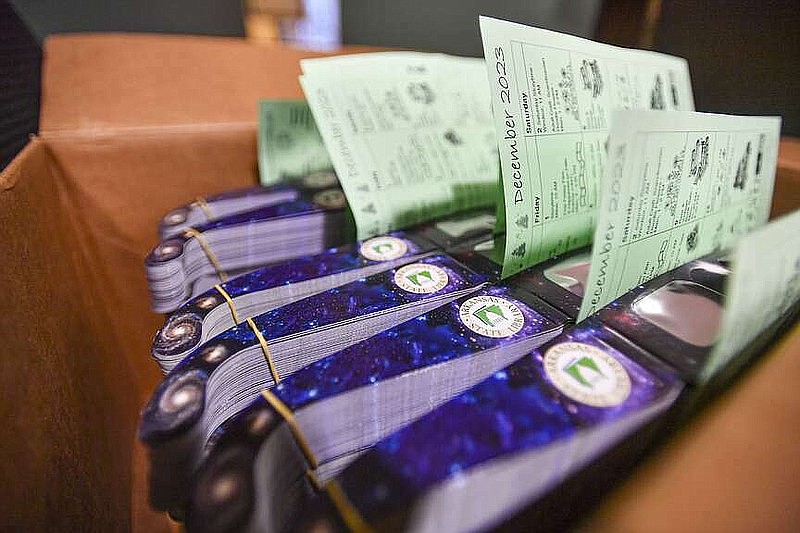Solar eclipse glasses for eye protection were worn all over Arkansas as viewers of Monday's total solar eclipse stared at the sun.
Now, Arkansans might be wondering what to do with those special glasses.
Bailey Moll, a spokesman with Waste Management, the recycling contractor for Little Rock, said the glasses are recyclable.
"They are mostly paper items ... I'd put them in a category similar to envelopes that have the plastic window so the address is visible," Moll said Tuesday morning. "The plastic percentage is so small compared to paper."
Moll said part of the recycling process involves sorting the collected items into different categories.
"Products with mixed materials are the hardest for us to sort, but with this ratio, we'd put it with paper," he said.
The lenses could be cut out of the glasses, Moll said, but doing so is not necessary.
"We talk about reduce, reuse and recycle. With an item like this, that might be hard to sort, so reusing might be more ideal than recycling," he said. "Donating these might be far better than putting it in a curbside recycling bin."
One business accepting donated used glasses from Monday's eclipse is Eclipse Glasses USA, owner Roger Sarkis said Tuesday.
Eclipse Glasses USA, based in Provo, Utah, is helping collect used glasses to send to Chile and Argentina. The company sold half a million glasses in preparation for the total eclipse, Sarkis said.
The owner also said the company did a similar project in 2017 where they sent undamaged, used glasses to Chile.
"We take donated glasses that are used and undamaged and then we're going to send them to students in Chile and Argentina," he said.
An annular solar eclipse is expected to be able to be seen in parts of those countries in October.
"Those eclipses aren't like what parts of the U.S. saw on Monday. They are sometimes called 'ring of fire' eclipses. There is no point at which those eclipses are safe to view without protective eyewear," Sarkis said. He said that is why it is extra important for students in those areas to have glasses.
"We aren't collecting these glasses and reselling them. We are sending donated items and working to send them to students that need them in order to view the eclipse," he added.
The business owner said that the company is focused on education and providing an equal chance for K-12 students to be able to witness such an event safely.
"We're helping because we know how to ship lots of glasses there safely," Sarkis said.
He also added that some qualifications have to be met in order for glasses to be donated.
"The paperboard glasses have to be made in the U.S., have the manufacturer's address and contact info, and bear the ISO logo," Sarkis said.
If the glasses are scuffed or only slightly scratched, he said there is a chance that they could still be safe to use.
"As long as the lenses are actually cut through, there is a chance they are safe and could be donated," he said.
Sarkis said the glasses can just be shipped in a regular envelope to:
Eclipse Glasses USA, LLC
PO BOX 50571
Provo, UT 84605
Sarkis also said that, despite being left outside or in an area with constantly changing temperatures, glasses used to view the total eclipse should be safe to donate.
"Sometimes you'll see a warning about only using the glasses for three minutes at a time [but] that doesn't mean the light is deteriorating the lens," Sarkis added. "Some companies just want to err on the side of caution, because you are still looking at the sun and in order to see the sun, some of that light or radiation has to come through. Otherwise you wouldn't see anything."
